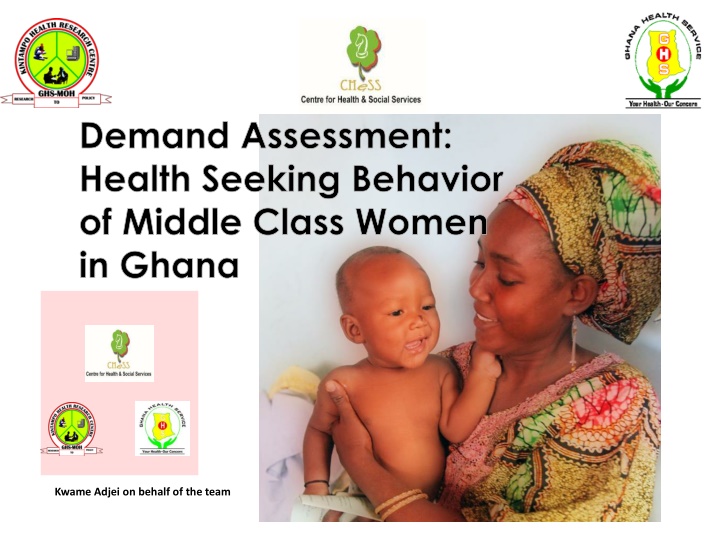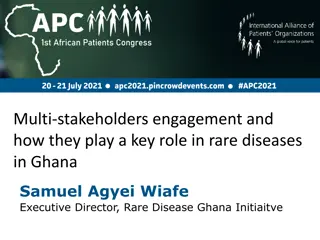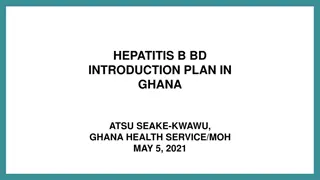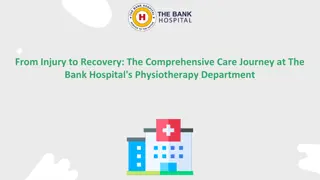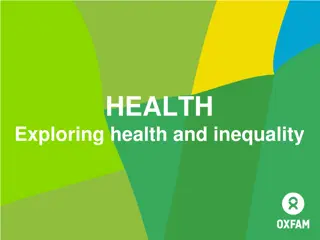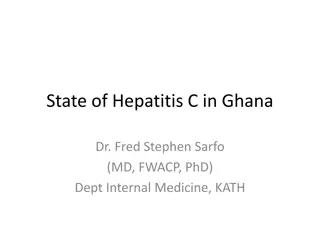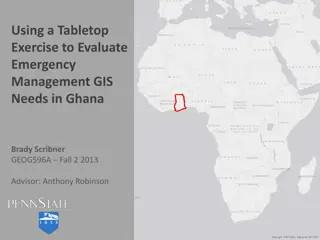Health Seeking Behavior of Middle Class Women in Ghana
This study examines the health seeking behavior of middle-class women in Ghana, shedding light on their demands and assessments. It delves into the factors influencing their decisions and aims to contribute to a better understanding of their healthcare choices.
Download Presentation

Please find below an Image/Link to download the presentation.
The content on the website is provided AS IS for your information and personal use only. It may not be sold, licensed, or shared on other websites without obtaining consent from the author.If you encounter any issues during the download, it is possible that the publisher has removed the file from their server.
You are allowed to download the files provided on this website for personal or commercial use, subject to the condition that they are used lawfully. All files are the property of their respective owners.
The content on the website is provided AS IS for your information and personal use only. It may not be sold, licensed, or shared on other websites without obtaining consent from the author.
E N D
Presentation Transcript
Demand Assessment: Health Seeking Behavior of Middle Class Women in Ghana Kwame Adjei on behalf of the team
Team Members Kwame Adjei Samuel Afari Samuella Adjei Irene T.Azindow Tony Seddoh Seth Owusu-Agyei *Sam Adjei (Bereaved: 1948-2016)
Outline Introduction Methods Results Conclusion Recommendation Acknowledgement
Introduction Poverty in Sub-Saharan Africa is gradually reducing and the middle class is said to be growing as evidenced in a recent study conducted by Standard Bank. Evidence from Ghana suggests that urbanization in the country appears to be increasing and it is anticipated that by 2020, the urban population will be 60% compared with the current45% However, associated with the increased urbanization is a major threat to women s health
Introduction In light of this Pharm Access and Ghana s Embassy of the Kingdom of Netherlands empowered the Centre for Health and Social Services (CHeSS) in collaboration with the Kintampo Health Research Centre (KHRC) ,Ghana Health Service (GHS), to assess the health seeking behavior of middle class women in Ghana with the view of developing a business strategy that meets their demands
Methods This was a qualitative study carried out within Accra and Tema metropolis in 2015 Five (5) Focus Group Discussions (FGDs) and thirty (30) In-depth Interviews (IDIs) were conducted among middle class women. Networking appointments were needed to recruit participant for the IDIs and snowballing followed by
Methods For the FGDs, there were 5 groupings and each comprised at least 10 people Purposive sampling was employed for group recruitments in the FGDs All qualitative interviews were tape-recorded and transcribed. The responses were aggregated according to themes and subthemes using the Nvivo (version 10) Software and quotes reflecting these were produced
Study Area ACCRA & TEMA GHANA
Background of Participants Over 80 participants Lecturers and selected students from the University of Ghana Senior personnel of the civil service Female parliamentarians Ladies associations (bankers, lawyers, ministries (MOH) etc) Women in perceived affluent communities (Estates)
Themes & Subthemes Women s lifestyle Actions taken before seeking health care Health Seeking Preferences (Private or Public) Perception of quality health care Perception of Ghana s National Health Insurance Scheme (NHIS) Perception of Standardized Women s Health Facility
Lifestyle Daily Activities: I wake up at 4 am and start getting the children ready for school. So the children wake up at 5 by which time I have prepared their snack for school, pack their bags and their clothes for school as well. We leave home latest by 6:15 and I drop them at school between 6:50 and 7 o clock and I get to work by 7:25. Officially I close at 5 but it run to 7 at times. I get home between 8pm to 9pm and I go to bed after 10pm [IDI with a Banker] When I get out, there is either a line-up of a whole series of committee meetings. I am supervising five PhD students, four masters students and it goes on and on; I am on several committees, member of the academic board, a lots of appointments and promotions, nursing school, pharmacy, atomic energy, VC s various special committees, ORID will throw in a proposal. The stress goes on and on. This is typical day in my life [IDI with Lecturer]
Actions taken before seeking health care If I feel like the symptoms is like malaria, I will just go to the pharmacy and get ACTs, but if I take it and it doesn t work I go to the hospital [FGD with women s group] With cold for example, I take lemon and ginger, mixed with tea or hot water and honey. Just last week I had a severe cold I took it with a lot of fluids [FGD with affluent community]
Health Seeking Preferences I will go to the private facility. The public is overcrowded; even before you will be attended to, you will go through wahala, so that alone am not comfortable. I prefer my own doctor. With private you have all the attention. If I have the money, no matter the condition I would choose private over public, then a specialist to deliver care [IDI with university student] I always like people to go to the public facilities for specifics because that is where they have a lot of specialist with different views and opinions instead of having only one person at the private hospital [IDI with university lecturer]
Health Seeking Preferences Sometimes you have to sit all day at the public facility. I remember I had Apollo and when it started I just went to the hospital the following day and I had to wait the whole morning only to be told that the morning doctor has closed so we have to wait for the afternoon doctor and I had to go to Accra too so I was getting fed-up. I wanted to go but the nurses won t give me my card so I was forced to stay. Sometimes the waiting time and the behavior of the health workers at the facility is the problem [FGD with women s group]
Perception of Quality Care Quality care embraces everything from the entrance to the exit point. The duration the doctor spent with you, how he will investigate, prescription, drug delivery, counseling all boils down to quality care because at the end of the day you should move out of the facility satisfied that someone has heard you and has addressed your concerns such that the medication given you will enable you come back to your former state. So quality care embraces all these [IDI with senior personnel]
Perception of Ghanas National Health Insurance Scheme It s really good. You will go and for some of the drugs you don t have to pay physicalcash. It helps [IDI with senior personnel] My NHIS card has expired. Am not motivated to renew because when you go to the hospital the process is long and the doctor barely has time. You will also not get quality drugs. I would prefer my cash and carry [IDI with university lecturer].
Perception Of Standardized Womens Health Facility All participants were in favor of a standardized women s health facility Access to standard quality health to me means being able to be attended to by qualified and professional medical staff anytime I am in need of health intervention or ill in a hospital. I would be willing to access such facilities [IDI with University Lecturer]
Perception Of Standardized Womens Health Facility If you look at the mall you can buy everything so I think people like the idea of one stop shop. Health care under one roof, easy access with all the needed infrastructure like a waiting room, play room for kids and we will spend the money [FGD with affluent women]
CONCLUSION AND RECOMMENDATION
In concluding Most middle class women have the same lifestyle and daily activities They have divergent views on the type of health facilities they prefer and the NHIS They are however interested in a model of network clinics which cater for all their health needs (one stop shop)
As recommendations In order to have a standardized and effective women s health facility, it is recommended that: Care seeking should be by appointment Waiting time should conform to international standard There should be good confidentiality of data There should be good rapport between health workers and patients. Health workers should be friendly and accommodating There should be privacy and a waiting room/place for children packed with books/magazines and toys record keeping and
Future Research Implementation Research Barriers and Facilitators Cost Effectiveness studies
Acknowledgement The study participants Pharm Access and the Netherlands Embassy The Management and staff of CHeSS and KHRC Organizers of the 2016 African Health Economics and Policy Association (AfHEA 2016 conference)
Thank you!!! Merci!!!
